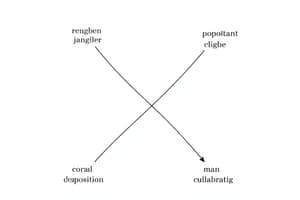Podcast
Questions and Answers
Which of the following is a component of a categorical proposition?
Which of the following is a component of a categorical proposition?
- Subject
- Predicate
- Copula
- All of the above (correct)
What does a quantifier indicate in a categorical proposition?
What does a quantifier indicate in a categorical proposition?
- The linking verb
- The predicate term
- The quality of the proposition
- The degree of universality of the subject (correct)
Which of the following is an example of a universal quantifier?
Which of the following is an example of a universal quantifier?
- All (correct)
- Several
- Most
- Some
What does the subject term in a categorical proposition refer to?
What does the subject term in a categorical proposition refer to?
In a categorical proposition, what role does the copula serve?
In a categorical proposition, what role does the copula serve?
What does the 'quality' of a categorical proposition refer to?
What does the 'quality' of a categorical proposition refer to?
If a proposition includes a universal quantifier, what type of proposition is it?
If a proposition includes a universal quantifier, what type of proposition is it?
Which of the following describes a 'particular' proposition?
Which of the following describes a 'particular' proposition?
Which term refers to the linking verb in a categorical proposition?
Which term refers to the linking verb in a categorical proposition?
What is the standard arrangement for a categorical proposition?
What is the standard arrangement for a categorical proposition?
In the proposition 'Some students are scholars,' which term is the subject?
In the proposition 'Some students are scholars,' which term is the subject?
Which proposition is an example of an affirmative statement?
Which proposition is an example of an affirmative statement?
What is the term for a quantifier that uses words like 'some' or 'most'?
What is the term for a quantifier that uses words like 'some' or 'most'?
Which of these propositions refers to the entirety of its subject's extension?
Which of these propositions refers to the entirety of its subject's extension?
In the statement, 'All soldiers are disciplined', what is the predicate?
In the statement, 'All soldiers are disciplined', what is the predicate?
Flashcards
Categorical Proposition
Categorical Proposition
A statement that directly asserts an agreement between a subject and a predicate.
Subject (of a Proposition)
Subject (of a Proposition)
The element denoting what the proposition is about.
Predicate (of a Proposition)
Predicate (of a Proposition)
The element that attributes a quality or characteristic to the subject.
Copula
Copula
Signup and view all the flashcards
Quantifier
Quantifier
Signup and view all the flashcards
Universal Quantifier
Universal Quantifier
Signup and view all the flashcards
Particular Quantifier
Particular Quantifier
Signup and view all the flashcards
Subject Term
Subject Term
Signup and view all the flashcards
Predicate Term
Predicate Term
Signup and view all the flashcards
Quality (of a Proposition)
Quality (of a Proposition)
Signup and view all the flashcards
Quantity (of a Proposition)
Quantity (of a Proposition)
Signup and view all the flashcards
Square of Opposition
Square of Opposition
Signup and view all the flashcards
Contradiction
Contradiction
Signup and view all the flashcards
Contrariety
Contrariety
Signup and view all the flashcards
Subalternation
Subalternation
Signup and view all the flashcards
Study Notes
- A categorical proposition gives a direct assertion of agreement between the subject and predicate terms; it is also known as a simple proposition.
Elements of a Proposition
- Subject.
- Predicate.
- Copula.
Standard Form of Categorical Proposition
- Standard categorical propositions are divided into three parts: quantifier, predicate term, and subject term.
Quantifier
- A quantifier indicates the degree of universality (quantity) of the subject.
- It is divided into two categories: universal and particular.
Universal Quantifier
- Universal quantifier takes the subject in its entirety, using terms like "all," "every," and "any," as well as "no," "none," and similar terms for negative propositions.
- Example: All laptops are expensive, or none of them are good.
Particular Quantifier
- Particular quantification uses terms like "some," "at least one," "most," "almost all," and "the majority."
- These quantifiers assert that at least one member of the subject class is (or is not) a member of the predicate class.
- Example: Some students are scholars, or at least one student is a scholar.
Subject and Predicate Terms
- The subject term is what is being affirmed or denied about, and the predicate term is what is affirmed or denied of the subject term.
- Both terms constitute the matter of the proposition.
- In "Some preachers are lay people," the subject term is 'some preachers' and the predicate term is 'lay people'.
Copula
- The copula is the linking verb, such as "is" (am, are, was, were) and "is not" (am not, are not, was not, were not), indicating agreement or disagreement between the subject and predicate.
- The quantifier determines the degree of disagreement or agreement.
- It is the copula that gives the form of the proposition.
- The standard form follows the subject-copula-predicate arrangement.
- Example: All soldiers are disciplined.
Quality and Quantity of Categorical Propositions
- Quality refers to the relation between the two terms: if there is agreement, the proposition is affirmative, and if there is disagreement, it is negative.
- Examples: "All deep-thinkers are philosophers" is affirmative, while "An angel is not a devil" is negative.
- Quantity refers to the number of individuals to whom the subject term applies.
- If the proposition uses a universal quantifier, then it is universal, and if it uses a particular quantifier, then it is a particular proposition.
Quality and Quantity Combined & Square of Opposition
- A proposition
- E proposition
- I proposition
- O proposition
Types of Logical Opposition
- Contradiction exists between propositions that differ in both quantity and quality (A and O, E and I).
- Contrariety exists between universal propositions that differ in quality only (A and E).
- Subcontrariety exists between particular propositions that differ in quality only (I and O).
- Subalternation exists between two propositions with the same quality but differing in quantity (A and I, E and O); this is the only relation where the starting proposition matters.
Studying That Suits You
Use AI to generate personalized quizzes and flashcards to suit your learning preferences.




